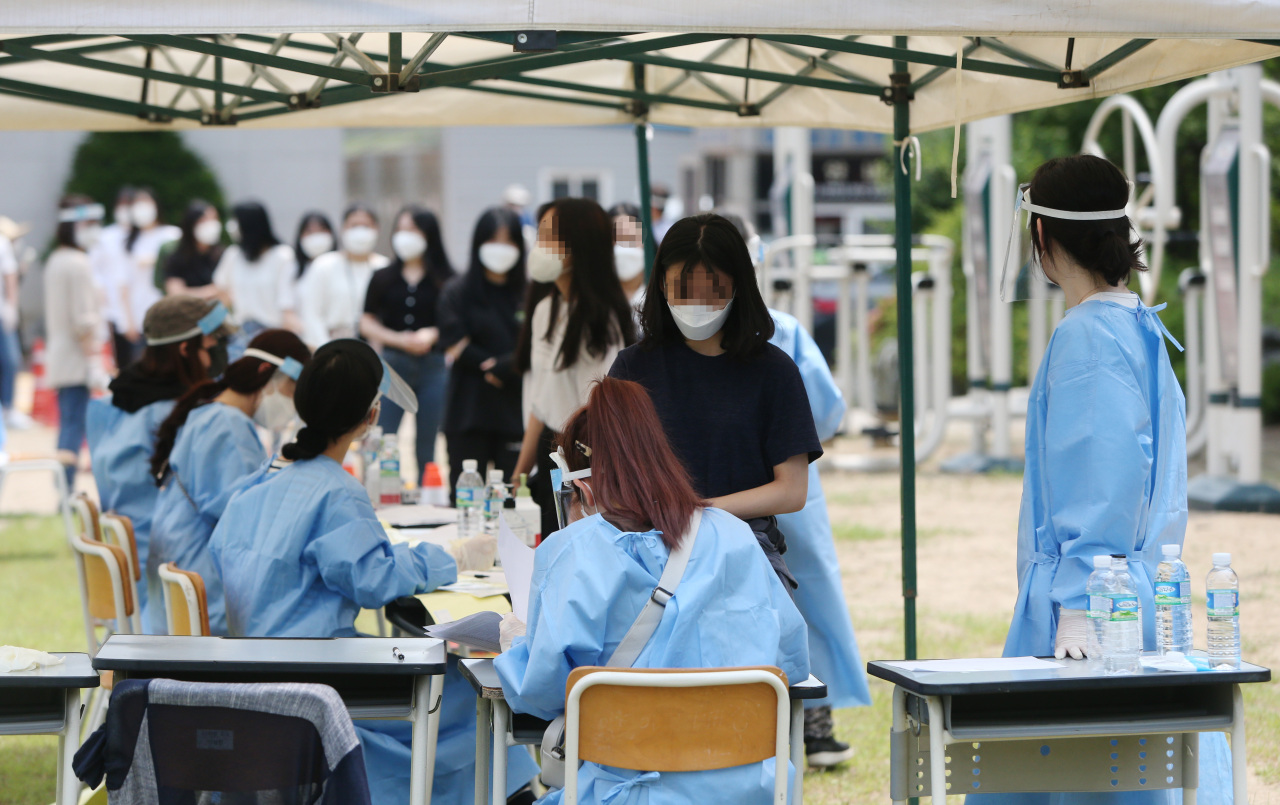South Korea reported 57 new cases of the novel coronavirus on Sunday, amid rising fears over the virus’s spread in the densely populated Greater Seoul area, as 1.35 million more students were set to return to school Monday.
Of the new cases, 53 were domestic cases, 52 of which were registered in Seoul, Incheon and Gyeonggi Province -- home to nearly half of the country’s population. The other four cases were imported from overseas, two of them being detected at the airport, according to the Korea Centers for Disease Control and Prevention.
It was the second consecutive day that Korea saw more than 50 cases -- the threshold set by the government for eased social distancing practices and reopening. Some 51 new cases were reported a day earlier.
The average number of confirmed patients increased from 23.1 per day on average from May 10-23 to 39.6 from May 24-June 6, according to authorities, with risks of COVID-19 transmission having increased.
Despite the heightened risks of COVID-19 transmission, the government said Sunday it is not now considering going back to the stricter quarantine regime that was in place a month earlier.
“Even though community spread continues, epidemiological inspectors’ (capacity) of tracing new patients and the health care system’s capacity of accommodating them can cope with (the increasing cases) without problems,” said Health Minister Park Neung-hoo at a briefing Sunday.
Korea shifted its quarantine regime to “routine distancing” on May 6 on the back of a slowing infection rate, allowing people to resume daily activities.
About one month into loosened distancing, a flurry of infection clusters emerged: nightclubs and bars in Seoul nightlife district Itaewon, a logistics center in Bucheon, Gyeonggi Province, small group gatherings of church pastors and, most recently, a table tennis club and a networking marketing firm in Seoul.
So far, 133 cases have been traced to the logistics center and 82 linked to the church gatherings.
Authorities’ latest concern relates to cases traceable to Seoul-based health product retailer Richway, an unregistered business that has organized promotional events involving meals and recreational activities mostly for the elderly, who are more vulnerable to the novel coronavirus than those younger.
As of Sunday, 45 patients have been identified as linked to the firm, according to the KCDC.
What is further keeping authorities on their toes are the cases with unclear transmission routes. Out of 586 cases reported over the past two weeks, infection routes of 8.7 percent remain unknown.
A patient who tested positive for the coronavirus on Sunday spent some nine hours at the popular theme park Lotte World in eastern Seoul on Friday, according to the Songpa district office. The announcement led to the early closure of the theme park on Sunday.
The spike in new infections comes ahead of the resumption of in-person classes for the last group of students, scheduled for Monday. Some 1.35 million students -- first-year middle school students and fifth- and sixth-year elementary school students -- were to return to classrooms in the final phase of school reopenings.
New clusters of infections shut down some 514 schools, mostly in Greater Seoul, and they returned to remote learning. As of Sunday, there have been no infections reported at schools, according to health authorities.
With 57 new cases, the country’s total caseload rose to 11,776. The death toll remained flat at 273. Some 10,552 patients have so far been released from quarantine upon full recoveries, putting the number of patients recovered at 89.6 percent of all confirmed cases, according to the KCDC.
The country’s overall mortality rate for COVID-19 patients is 2.32 percent, but it is much higher among those aged 80 or older at 26.13 percent, and those in their 70s at 10.56 percent.
Korea has so far run 1,012,769 tests for the novel coronavirus, with 26,481 people still awaiting results.
By Ock Hyun-ju (
laeticia.ock@heraldcorp.com)








